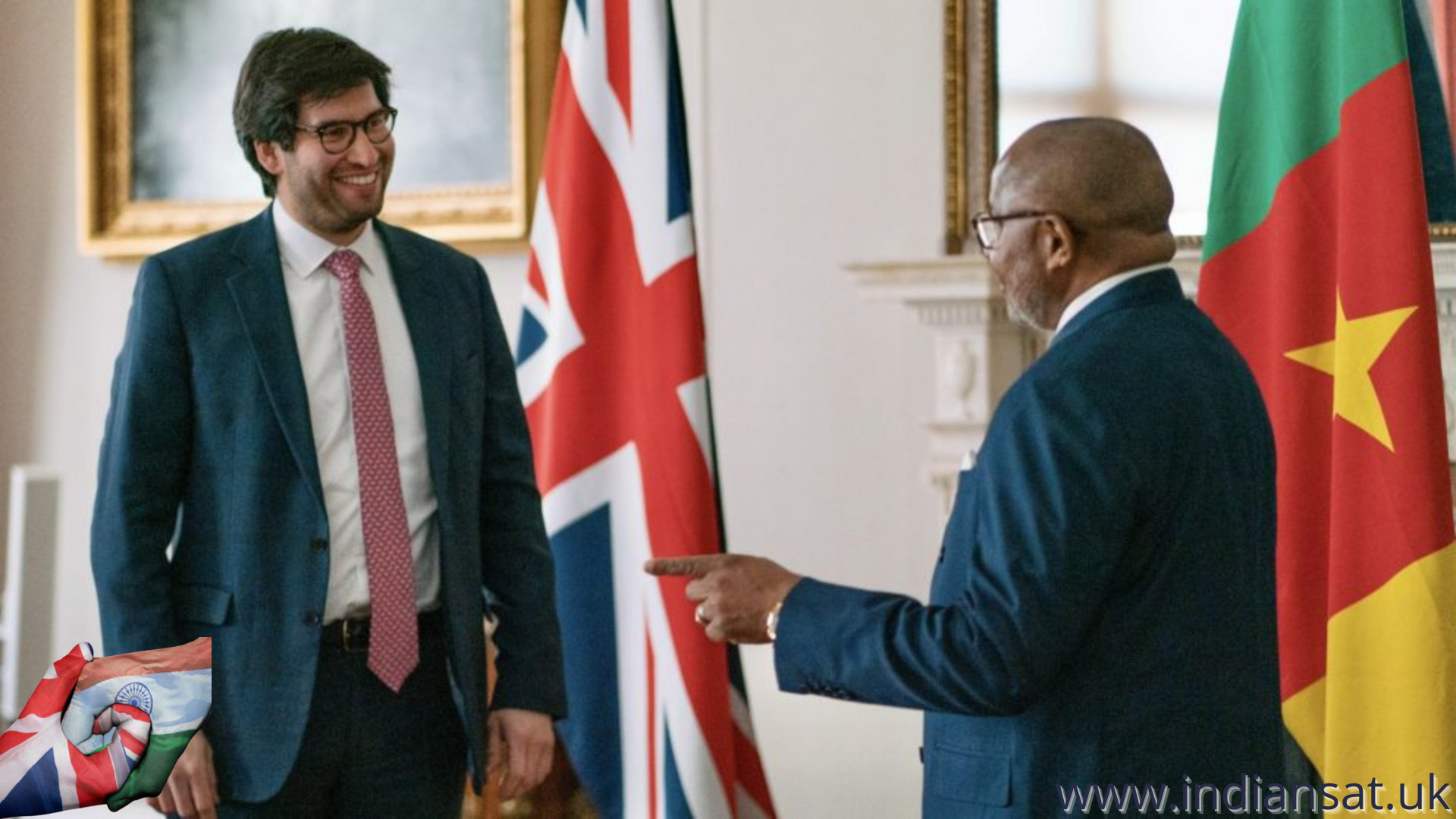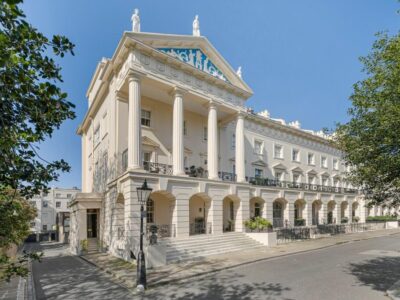The UK and India’s shared imperialist and Commonwealth history will help the two countries close a trade deal, according to trade minister Ranil Jayawardena.
Jayawardena also told City A.M. in a wide ranging interview that a trade deal would help the UK have more “honest conversations” with India over things like its human rights and press freedom records.
It comes after India has been very reluctant under Prime Minister Narendra Modi to sign international trade deals, with the country’s last agreement inked 10 years ago.
As India’s economy has grown into the sixth biggest in the world, it has also become far more protectionist under Modi’s watch.
However, Jayawardena said he is confident the UK and India will buck this trend and close a deal.
“We have a really strong tie compared to other markets that India might have around the world, because of our common language and shared history,” he said.
“We have a ‘living bridge’ as Prime Minister Modi says between our countries.
“We have complementary economies and I don’t think the deal is only in goods and services, but also for investment.”
Boris Johnson twice had to cancel in-person trips to India this year to meet Modi as Covid-19 surged in the UK and then India.
Johnson eventually conducted a series of virtual meetings with Modi, including at the G7 summit two weeks ago, with the pair striking a £1bn trade and investment deal.
Modi said the pair agreed to “work towards a quantum leap in our cooperation in all areas”, including in trade and defence.
Gareth Price, senior research fellow at Chatham House, said “it is possible the position within India has changed as a result of Covid and an economic slowdown that had pre-dated the pandemic” and is now more open to negotiating trade deals.
Price added: “The imperial history is undoubtedly an impediment, vis-a-vis other countries that didn’t invade India, except inasmuch as one legacy of Imperial rule is that the UK has an extensive Indian diaspora community.
“If there has been a shift in India’s thinking, the implications of a trade deal with the EU would be of much greater significance to India than one with the UK, and potentially India would be thinking of securing a deal with the UK as a trial run for one with the EU.”
Jayawardena said some of the key areas in talks will be around increasing access for Scotch whisky makers and agricultural producers to Indian markets, along with enhanced access for the UK’s services sectors.
When asked if UK negotiators will push for more visa opportunities for businessmen and women going to India, the trade minister was tightlipped.
“We always want to makes sure there are opportunities for services trade between countries, but we’ve also seen in the pandemic that more can be done remotely than ever before,” Jayawardena said.
“We’ve seen digital trade, not only in terms of paperwork, but in terms of opportunities to trade digitally has enabled people to work remotely from all over the world.”
Some Tory MPs complained in the lead up to the G7 that the UK had to be tougher on Modi and his government over the treatment of western companies and workers operating in India.
Former Brexit secretary David Davis told the Financial Times that India had a habit of removing Modi’s critics from social media, while also accusing the authorities of seizing “by force the property of at least three American and British companies operating in India”.
There are also concerns about press freedom in India – it is ranked 142 out of 180 countries on the Reporters Without Borders’ Press Freedom Index – and human rights in the disputed region of Kashmir.
Jayawaderna said having a closer relationship with Modi’s government would help the UK wield greater influence over India on human rights and press freedom.
“India is the world’s largest demcoracy, we’re the world’s oldest democracy – it doesn’t mean we’ll do everything in the same way. Of course we raise all store of concerns wherever we feel is necessary,” he said.
“I would contend that having a stronger trade relationship with any country in the world allows you to have more honest conversations. That is what we believe is really important with India and many others.”
The trade minister also emphasised India’s importance as a part of the UK’s post-Brexit tilt toward the Asia Pacific in foreign policy.
Another part of this tilt is the UK’s potential ascension to the Comprehensive and Progressive Agreement for Trans-Pacific Partnership (CPTPP).
Trade secretary Liz Truss announced earlier this week that the UK will soon begin formal negotiations to join the 11-country trading bloc.
The partnership – which includes countries like Australia, Canada, Japan, Vietnam and Malaysia – sees tariffs removed on 90 per cent of goods and provisions for enhanced data sharing.
The countries involved make up about 13.4 per cent of global GDP, about £10 trillion, making it one of the largest trading blocs in the world.
The combined economic size of the CPTPP’s member states is smaller than the EU, however some of the countries involved are considered high-growth economies.
“Even if the opportunities might not be available in one market now, they will be in the future because we’re hitching ourselves by joining this trade area to some of the fastest growing countries in the world,” Jayawaderna said.
“But it’s got to be on the right terms, I think it’s really important we don’t box ourselves in and let anyone else set the agenda.”
The UK and India’s shared imperialist and Commonwealth history will help the two countries close a trade deal, according to trade minister Ranil Jayawardena.
Jayawardena also told City A.M. in a wide ranging interview that a trade deal would help the UK have more “honest conversations” with India over things like its human rights and press freedom records.
It comes after India has been very reluctant under Prime Minister Narendra Modi to sign international trade deals, with the country’s last agreement inked 10 years ago.
As India’s economy has grown into the sixth biggest in the world, it has also become far more protectionist under Modi’s watch.
However, Jayawardena said he is confident the UK and India will buck this trend and close a deal.
“We have a really strong tie compared to other markets that India might have around the world, because of our common language and shared history,” he said.
“We have a ‘living bridge’ as Prime Minister Modi says between our countries.
“We have complementary economies and I don’t think the deal is only in goods and services, but also for investment.”
Boris Johnson twice had to cancel in-person trips to India this year to meet Modi as Covid-19 surged in the UK and then India.
Johnson eventually conducted a series of virtual meetings with Modi, including at the G7 summit two weeks ago, with the pair striking a £1bn trade and investment deal.
Modi said the pair agreed to “work towards a quantum leap in our cooperation in all areas”, including in trade and defence.
Gareth Price, senior research fellow at Chatham House, said “it is possible the position within India has changed as a result of Covid and an economic slowdown that had pre-dated the pandemic” and is now more open to negotiating trade deals.
Price added: “The imperial history is undoubtedly an impediment, vis-a-vis other countries that didn’t invade India, except inasmuch as one legacy of Imperial rule is that the UK has an extensive Indian diaspora community.
“If there has been a shift in India’s thinking, the implications of a trade deal with the EU would be of much greater significance to India than one with the UK, and potentially India would be thinking of securing a deal with the UK as a trial run for one with the EU.”
Jayawardena said some of the key areas in talks will be around increasing access for Scotch whisky makers and agricultural producers to Indian markets, along with enhanced access for the UK’s services sectors.
When asked if UK negotiators will push for more visa opportunities for businessmen and women going to India, the trade minister was tightlipped.
“We always want to makes sure there are opportunities for services trade between countries, but we’ve also seen in the pandemic that more can be done remotely than ever before,” Jayawardena said.
“We’ve seen digital trade, not only in terms of paperwork, but in terms of opportunities to trade digitally has enabled people to work remotely from all over the world.”
Some Tory MPs complained in the lead up to the G7 that the UK had to be tougher on Modi and his government over the treatment of western companies and workers operating in India.
Former Brexit secretary David Davis told the Financial Times that India had a habit of removing Modi’s critics from social media, while also accusing the authorities of seizing “by force the property of at least three American and British companies operating in India”.
There are also concerns about press freedom in India – it is ranked 142 out of 180 countries on the Reporters Without Borders’ Press Freedom Index – and human rights in the disputed region of Kashmir.
Jayawaderna said having a closer relationship with Modi’s government would help the UK wield greater influence over India on human rights and press freedom.
“India is the world’s largest demcoracy, we’re the world’s oldest democracy – it doesn’t mean we’ll do everything in the same way. Of course we raise all store of concerns wherever we feel is necessary,” he said.
“I would contend that having a stronger trade relationship with any country in the world allows you to have more honest conversations. That is what we believe is really important with India and many others.”
The trade minister also emphasised India’s importance as a part of the UK’s post-Brexit tilt toward the Asia Pacific in foreign policy.
Another part of this tilt is the UK’s potential ascension to the Comprehensive and Progressive Agreement for Trans-Pacific Partnership (CPTPP).
Trade secretary Liz Truss announced earlier this week that the UK will soon begin formal negotiations to join the 11-country trading bloc.
The partnership – which includes countries like Australia, Canada, Japan, Vietnam and Malaysia – sees tariffs removed on 90 per cent of goods and provisions for enhanced data sharing.
The countries involved make up about 13.4 per cent of global GDP, about £10 trillion, making it one of the largest trading blocs in the world.
The combined economic size of the CPTPP’s member states is smaller than the EU, however some of the countries involved are considered high-growth economies.
“Even if the opportunities might not be available in one market now, they will be in the future because we’re hitching ourselves by joining this trade area to some of the fastest growing countries in the world,” Jayawaderna said.
“But it’s got to be on the right terms, I think it’s really important we don’t box ourselves in and let anyone else set the agenda.”
![]()






